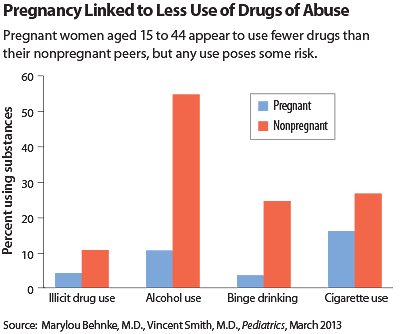Several commonly abused drugs, both legal and illegal, can have serious effects on a fetus, two pediatricians cautioned their colleagues in the March Pediatrics.
“Alcohol can have pretty profound teratogenic, neurobehavioral, and anatomic effects,” said lead researcher Marylou Behnke, M.D., a professor of pediatrics at the University of Florida, in an interview with Psychiatric News. “We don’t see the same somatic changes with other drugs, but you can see subtle neurobehavioral changes that can be hard to tease out because they don’t show up until the children grow older.”
Behnke and coauthor Vincent Smith, M.D., M.P.H., both neonatologists, presented a technical report on the short- and long-term effects of prenatal substance abuse on the exposed fetus. They covered the most common substances used by pregnant women: nicotine, alcohol, marijuana, opiates, cocaine, and methamphetamine.
Some health messages may be getting through to this cohort. For a start, only 4.4 percent of pregnant women aged 15 to 44 acknowledge use of any illicit drugs, 10.8 percent drink alcohol, and 16.3 percent smoke cigarettes, according to data from the National Survey on Drug Use and Health, sponsored by the Substance Abuse and Mental Health Services Administration. Rates are significantly higher among nonpregnant women (see chart).
Furthermore, drug use by a pregnant woman does not automatically lead to problems in the offspring, but it does increase the baby’s risks, Behnke pointed out.
From a population perspective, the effects of these drugs on a baby may seem subtle but they should not be ignored.
“Biologically and socially, drug addiction is not a good atmosphere to grow up in,” she said. Aside from its biological effects, addiction can change maternal behavior in ways that can affect the fetus by leading to poor nutrition or health care, or exposure to violence or infection.
In addition, a mother’s use of more than one drug at a time only complicates effects on the child, said Behnke.
Recent research indicates that the effects of drugs other than tobacco are less severe than was anticipated a couple of decades ago, when a nation obsessed with “crack babies” figured that children would be horribly damaged by maternal cocaine use, she said.
The effects of each of these drugs vary. Nicotine is a risk factor for low birth weight and is associated with decreased weight gain in the infant, possibly because the fetus is actually exposed to more nicotine than the mother is. However, infants experience no serious withdrawal effects. The effects on long-term growth are not clear, but problems with impulsivity, concentration, language development, and learning and memory have been highlighted by other researchers.
Alcohol is the best-studied of the drugs used by pregnant women. It has strong effects on fetal growth and anomalies, as well as influencing longer-term effects on growth, behavior, cognition, and academic achievement.
Marijuana has minor effects on infant neurobehavioral responses but has longer-term effects on behavior, cognition, and achievement, said Behnke and Smith.
“The most significant effect of prenatal opiate exposure is neonatal abstinence syndrome,” they noted. Behavior is affected, but there is either no consensus or a lack of data regarding cognition, language development, and academic achievement.
Cocaine has long-term effects on behavior and possibly language, as well as on fetal growth and infant neurobehavior.
“Studies of prenatal methamphetamine exposure are still in their infancy,” Behnke and Smith pointed out. Some effects have been noted on fetal growth and infant neurobehavior, but evidence is insufficient regarding most other outcomes.
Behnke said that a full spectrum of medical professionals must intervene when needed to lessen the risk to the fetus and the developing child.
“Whether we are ob/gyns, pediatricians, or psychiatrists, we as physicians have the opportunity to interact with patients at various points along the lifespan,” she said. “We should be in the business of trying to diagnose people and refer them to treatment. We may not have all the information yet, but we should state what we know and what we don’t know and develop therapies and places to refer our patients.” ■

